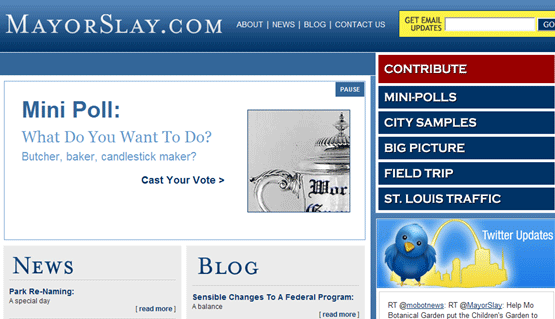Politicians are figuring out what social media technologies like blogs, Facebook, MySpace and Twitter have to offer: direct access to voters. More than ever before, they can bypass the professional press and deliver an uncensored, unfiltered — and unchecked — message.

“[Social media] allows me to gives my thoughts on the events of the day and the complete text of my comments from speeches and stuff that I give that the mainstream media might not normally cover,” said Francis Slay, the mayor of St. Louis, in a phone interview.
Slay, who was recently elected to his third term, has been blogging and using social media such as Twitter for years. Tony Messenger, Missouri state Capital political reporter and columnist for the St. Louis Post-Dispatch, wrote in a recent email that Slay is a “consistent user, he gets his message out, and he also has fun with it. He doesn’t just regurgitate talking points or news releases. Mostly, he uses the social media how it was intended, as interaction.”
Slay says new media technologies made it possible to publish his policy positions and get his message out. “It does help me communicate better…it really engages my constituents and people that have a stake in the city,” Slay said.
The Internet has leveled the playing field for political communication. Now, thanks in large part to social media, a growing number of people are going directly to the political source to get the latest information.
Mainstream Media’s Value?

Alexandra Samuel, an Internet researcher and CEO of social media consulting company Social Signal, says there are lots of examples of important investigative reporting. But during a recent phone interview Samuel said it’s only a small fraction of what’s produced by the mainstream media.
“Mostly what you read in newspapers feels like press releases,” Samuel said. “So can that be replaced? Yeah, that can totally be replaced. Why should I as a politician or political organization rely on some respectable news organization to essentially rewrite my press release and print it in their newspaper when I can send that same information directly to my constituents? There is not really much value added.”
Jake Wagman, a reporter for the St. Louis Post-Dispatch who covers St. Louis City Hall, said in a phone interview it’s helpful that Mayor Slay uses his blog to get his message out or send out tweets. He says as a journalist he can see what the mayor is up to whether it is big or small.
Perhaps more important, new media technologies leave an online record that is searchable by interested citizens and by journalists. However, Wagman said that you can’t interview a blog post.
“During an interview the mayor will say things more off the cuff which is usually what’s most revealing,” Wagman said. “Using social media he doesn’t have to endure the give and take and can stay on message.”
Objectivity and Watchdog Role Important
Despite the exponential growth of social media technologies, and the declining profit margins for some mainstream media, a large majority of people in the United States still prefer to get their political news from television.

Jeremy Hanson, communications director for Minneapolis Mayor R.T. Rybak, said in a phone interview that there is still a need for objective news media.
“It’s very handy for candidates and elected officials to be able to communicate directly to voters or their constituents … (but) people shouldn’t be forced to rely solely on information they get directly from politicians,” Hanson said.
It’s important in a healthy political environment for journalism to maintain its core functions to inform the public and keep a critical eye on government. But with the direct access politicians now have, is the mainstream media becoming irrelevant?
Columnist Tony Messenger wrote in an email that social media sometimes does scoop the mainstream media but Twitter and Facebook have actually increased the opportunities for reporters and politicians to interact.
“That can be a good thing for both of us,” Messenger said. “Using direct messages, with (Mayor) Slay and others, I’ve gained a better understanding of stories and instant access when it otherwise might not have been granted.”
It has become much easier for politicians to build a website with social media tools and other interactive capabilities. Most websites for politicians will feature a news section which looks and reads like content you might find in the local paper. There is just one important caveat: The sites are generally paid for by political campaigns and are likely to ensure the politicians remain in a positive light. Despite being free services, the same could be said about updates on Facebook or tweets sent out by politicians.
Reporter Jake Wagman calls Mayor Slay’s website a “24/7 campaign site.”
“I would hope people recognize it as a campaign-funded website,” Wagman said. “I don’t know if the causal reader recognizes that, but I think news consumers are pretty savvy.”
Wagman suggested that with as many information sources now available online people will go to multiple places to find out what’s happening in their city. But, Wagman said “it is incumbent upon traditional news media sources to provide information that readers want to see so they will still want to come to us.”
Steven Davy is a freelance journalist, and freelance radio reporter/producer. He regularly covers the defense industry and security related issues for UPI. Additionally he hosts a current affairs news magazine radio show called the Nonchalant Café Hour which broadcasts live in Kalamazoo, Mich. Steven is a second year graduate student at Michigan State University in the School of Journalism. His research has covered news media bias and framing issues, censorship during war, urban revitalization, renewable energy and climate change.


Great story. This reminds me a lot of a very similar piece I wrote back in September: http://www.sayfiereview.com/sayfie-review-featured-columnists1c.php?authid=2009021015474269&colid=2009090118420861
http://bit.ly/3RbTuw